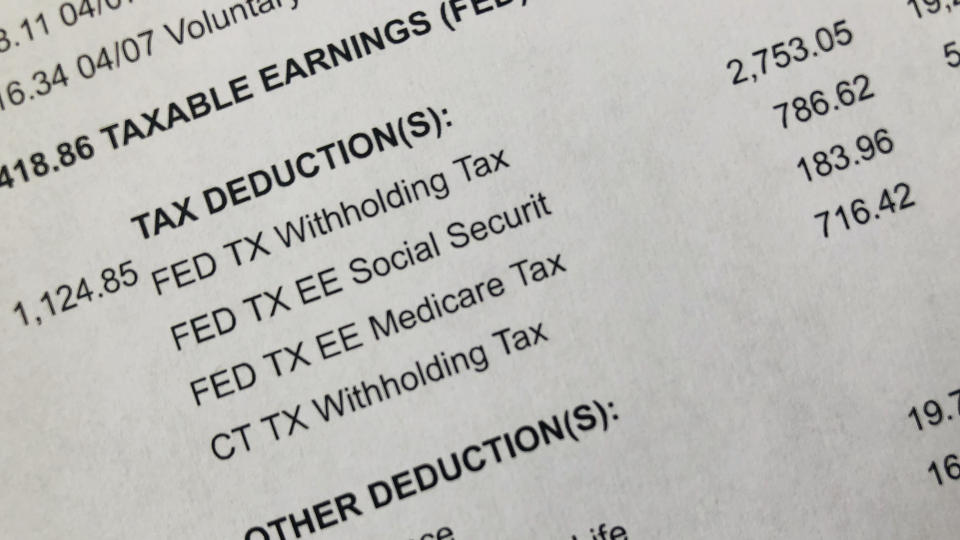13 Tax Deductions You Can Take Without Itemizing

When you file your taxes, you can claim the standard deduction or choose to itemize. However, recent changes in tax law have dramatically reduced the percentage of Americans who itemize.
For You: Taxes on Generational Wealth Just Changed: Here’s What You Should Know
Try This: Owe Money to the IRS? Most People Don’t Realize They Should Do This One Thing
In fact, only a low percentage of taxpayers now itemize, down from 30% before the passage of 2017’s Tax Cuts and Jobs Act.
But there are several so-called “above-the-line” deductions that all taxpayers can still take to reduce their taxable income, regardless of whether they choose to itemize. You can take the tax deductions without itemizing by entering them on Part II of Schedule 1 of your Form 1040.
Sponsored: $20k or more in credit card debt? Lower the amount you owe in just 3 simple steps.
IRA Contributions
Based on your modified adjusted gross income (MAGI) and whether a retirement plan at work covers you, contributions to your IRA may be tax-deductible. For tax year 2023, the MAGI limits for singles and heads of household covered by retirement plans at work start at $73,000, phasing out at $83,000. For joint filers, those limits are $116,000 and $136,000.
HSA Contributions
For tax year 2023, you may be able to deduct up to $3,850 as a single or $7,750 as a family for qualifying health savings account contributions. Those 55 and older can kick in another $1,000.
Self-Employed Retirement Plan Contributions
If you work for yourself and have your own 401(k), SEP-IRA or SIMPLE IRA, you can claim an above-the-line tax deduction for your contributions. Deductions for self-employed business owners can be large, as the IRS allows you to deduct your salary reduction contributions and any matching or non-elective contributions you make.
Student Loan Interest
As long as you meet various qualifications — which most borrowers do — the IRS allows you to deduct the lesser of $2,500 or the amount you paid in interest on your student loans. One of the most important limitations is that your MAGI must be below $75,000 as a single or $155,000 as a joint filer if you want the full deduction. A phaseout range applies to incomes up to $90,000 for singles and $185,000 for joint filers.
Some Alimony Payments
The deduction for alimony payments is no longer in effect, but if you have an older dissolution agreement, you may be in luck. Divorce decrees before Dec. 31, 2018, still allow for the deduction of alimony payments.
Unreimbursed Educator Expenses
The deduction for unreimbursed educator expenses isn’t large, but it can help reduce the tax bill of teachers, principals, counselors and the like. For tax year 2023, the IRS allows a deduction of $300 for buying supplies such as books, computer equipment, software licenses, and other teaching materials. The deduction is $600 for joint filers if both spouses are educators.
A Portion of Self-Employment Tax
If you run your own business, you’re responsible for paying both the employee and employer halves of the 15.3% self-employment tax. To help soften the blow, the IRS allows business owners to deduct the employer portion of the self-employment tax as an above-the-line deduction.
Health Insurance Premiums for the Self-Employed
In addition to half of the self-employment tax, business owners can deduct amounts they pay for health insurance, even if they don’t itemize their taxes.
Moving Expenses for Military Personnel
In most cases, if you’re on active duty as a military member and you’re required to move, you can take an above-the-line deduction for qualifying moving costs. The primary requirement is that you are given an order to change your permanent station.
Business Expenses for Performing Artists, Reservists and Fee-Based Government Officials
Most taxpayers itemize business deductions on Schedule A or Schedule C. Still, if you fall into one of the above categories, you may be able to take above-the-line deductions for various expenses. As the category has a lot of varying requirements, you probably should speak with a tax professional before you use this deduction.
Penalties on the Early Withdrawal of Savings
If you get hit with a penalty for withdrawing your savings early from an instrument like a certificate of deposit, you’re granted an above-the-line tax deduction for the amount you paid.
Archer MSA Contributions
The IRS allows above-the-line deductions for qualifying contributions to Archer medical savings accounts. These accounts were discontinued in 2007, but existing accounts were allowed to continue.
Other, Less Common Deductions
A number of additional above-the-line deductions are allowed for various expenses, but most of them are rare. For example, you can deduct reforestation amortization and expenses, the nontaxable amount of the value of Olympic and Paralympic medals, and attorney fees for certain unlawful discrimination claims. If you have any expenses you aren’t sure how to categorize, you should always consult a CPA or tax attorney.
More From GOBankingRates
This article originally appeared on GOBankingRates.com: 13 Tax Deductions You Can Take Without Itemizing
